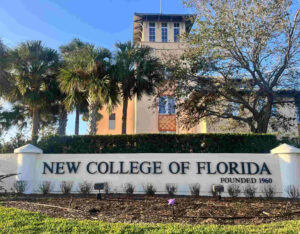It raises concerns about academic freedom, xenophobia and the direction of higher education in Florida.
By Alice Herman/Suncoast Searchlight
Original Air Date: April 18, 2025
Host: New College of Florida recently fired a Chinese professor under a contentious state law. That has drawn national attention and raised fresh concerns about academic freedom, xenophobia and the direction of higher education in Florida. The Suncoast Searchlight’s Alice Herman reports.

Alice Herman: Professor Kevin Wang is a Chinese asylum seeker with work authorization in the United States. New College abruptly dismissed him last month under a 2023 state law. Known as SB 846, the law restricts Florida’s public colleges and universities from hiring staff from China and other nations labeled “countries of concern.”
According to civil rights advocates and scholars, this appears to be the first time an asylum seeker has been removed from their position under the law.
The firing comes amid heightened U.S.-China tensions and growing scrutiny of Chinese nationals in American academic institutions.
But for students and observers of higher education, it signals something more immediate: a state-driven shift that may limit who can teach in public universities, threatening U.S. scholarship.
Gisela Kusakawa is the executive director of Asian American Scholar Forum.

Gisela Perez Kusakawa. Courtesy photo via Suncoast Searchlight.
Gisela Kusakawa: We see this trend and pattern of a less and less welcoming environment for Chinese students and international students overall. We often forget that the Asian-American community is a predominantly immigrant community. In the Asian-American scholar and scientific community, many of them—many, certainly, of our most prominent ones—came to the United States through the student visa pipeline. When we’re talking about maintaining US competitiveness and being able to foster and nurture the best and brightest talents, cutting off this pipeline would effectively make the United States less competitive.
SB 846 limits public colleges and universities in Florida from entering into agreements with institutions affiliated with the governments of China, Cuba, Iran, North Korea, Russia, Syria and Venezuela. It also goes a step further, restricting the ability of schools to simply hire employees from those countries who do not have a green card or full citizenship.
It includes a mechanism for exceptions, but only if such hires or partnerships are approved by the State University System’s Board of Governors.
SB 846 has a disproportionate impact on Chinese academics. According to the Institute of International Education’s recent annual Open Doors Report, more than 4,300 students from China were enrolled in Florida colleges and universities during the 2023–24 academic year, the second-largest group of international students in the state after those from India.

Photo via Suncoast Searchlight.
Wang’s firing has become a flashpoint in a broader legal and civil rights battle over Florida’s restrictions on hiring foreign nationals in public higher education.
The American Civil Liberties Union of Florida calls the law unconstitutional. The ACLU of Florida is part of the legal team representing a University of Florida professor and two Chinese doctoral students who had been accepted to study and work at Florida International University. The trio is challenging the constitutionality of SB 846 in a federal lawsuit.
The plaintiffs argue the law violates the Equal Protection Clause of the 14th Amendment and is preempted by federal immigration and foreign affairs law.
They likened the law to the Chinese Exclusion Act of 1882. That law barred Chinese laborers from immigrating to the United States during a period of widespread anti-Chinese sentiment.
On March 28—just two weeks after Wang’s firing—a federal judge in Miami issued a preliminary injunction, temporarily blocking enforcement of the law’s hiring restrictions as they apply to international students. The preliminary injunction applies to students statewide.

Graphic via Suncoast Searchlight.
Florida has since appealed that injunction and filed a motion to put the judge’s ruling on hold.
Florida also passed a measure in 2023 restricting Chinese citizens from purchasing property in the state.
GK: Right now, there’s a bigger concern that what is happening in Florida is just a taste of what may happen nationally on a federal level.
Wang’s firing drew surprise and condemnation.
Rosie Levine, executive director of the U.S.-China Education Trust, a Washington D.C.-based group focused on fostering academic exchange between the two countries, expressed alarm, describing the firing as “scary.”
A student in Wang’s class at New College told Suncoast Searchlight that the dismissal felt abrupt and wrong.
“It was barbaric,” said the student, who asked to remain anonymous.
In 2024, the school punished students who protested its administration during graduation.
Reporting for the Suncoast Searchlight, this has been Alice Herman.
To read the full story, go to suncoastsearchlight.org/new-college-fire-chinese-professor-sb846-alarm.
WSLR News aims to keep the local community informed with our 1/2 hour local news show, quarterly newspaper and social media feeds. The local news broadcast airs on Wednesdays and Fridays at 6pm.